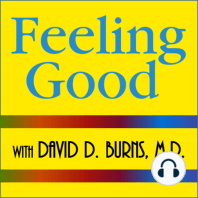84 min listen

322 How Skillful is your Shrink Featuring Kevin Cornelius LMFT
322 How Skillful is your Shrink Featuring Kevin Cornelius LMFT
ratings:
Length:
81 minutes
Released:
Dec 12, 2022
Format:
Podcast episode
Description
How Skillful is your Shrink! Now you can find out! The Exciting Recovery Coefficient-- and the FEAR the grips the hearts of the therapists who are afraid to use it! People often wonder how skillful or effective their therapist is, but until now, there was no very valid or precise way to know. But now there is, and it has fantastic implications for psychotherapy. Today, we feature an interview with Kevin Cornelius, a therapist at the Feeling Good Institute in Mountain View, California. Kevin Cornelius is a Licensed Marriage and Family Therapist in private practice at Feeling Good Institute, with in-person counseling for teens .Kevin is a Certified Level 4 Advanced TEAM-CBT Therapist and Trainer. I asked Kevin to write a brief description of his evolution from a career in acting to his career as a shrink. Here’s what he wrote: After many years of working as an actor I was ready for a change. After some painful personal events, I saw a therapist who was quite helpful to me. She helped me see that changing to a career as a therapist could be a great thing for me. I went to school and got my Master's in Marriage and Family Therapy. Just before I began applying for internships to complete licensure, I learned that the children's theatre group I had grown up in was looking for a new supervisor to lead the group following the death of its beloved founder and leader. This was a wonderful opportunity for me to use my theatre skills and my desire to help young people in their growth and development. I was very fortunate to be hired and worked as the director of the children's theatre group for 19 years. Towards the end of my years with the children's theatre, I was ready for a change and thought it might be time for me to finish getting my therapy license. It had been 15 years since I had worked with a patient in a therapy session, so I had a lot to learn! I was so lucky to discover David Burns and his amazing TEAM-CBT. The testing element of TEAM enabled me to see right away where I needed to improve so I could focus my efforts on improving specific skills. Being able to study with David in his Tuesday group at Stanford was a golden opportunity. Here was a framework designed to make therapy as effective as possible being taught (for free!) by one of the world's greatest therapists. I'm so happy I followed David's advice to get involved at Feeling Good Institute while I was still pre-licensed. Learning TEAM while I was completing the process to earn my license as a therapist enabled me to start my career in private practice with confidence and a stable foundation. Now, I get to continue learning from mentors at Feeling Good Institute, from the wonderful Feeling Good Podcast, and the valuable lessons I get from my patients. I'll sum up my good fortune with a theatre reference and quote the Gershwins: "Who could ask for anything more?" Kevin recently made the courageous decision to find out exactly how he was doing as a therapist. And the results surprised him tremendously. Background Information for today’s podcast Outcome studies with competing schools of psychotherapy in the treatment of depression have been disappointing. They all seem to come out about the same, slightly better than placebos, but not much. For example, in the British CoBalT study of 469 depressed patients treated with antidepressants vs antidepressants plus CBT, only 44% of the patients treated with antidepressants plus CBT experienced a 50% improvement in depression after six months of treatment, and the multi-year follow-up results weren’t any better. This was better than the patients treated with antidepressants alone, (only 22% experienced a 50% improvement), but still—to my way of thinking—very poor. We see more improvement than that in just one day in patients using the Feeling Good App. Here are just two of many online references to that landmark study: https://www.thelancet.com/journals/lanpsy/article/PIIS2215-0366(15)00495-2/fulltext https://www.thelancet.
Released:
Dec 12, 2022
Format:
Podcast episode